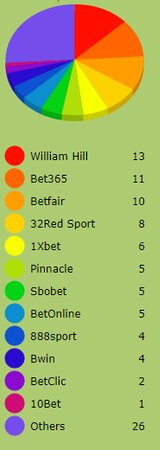Margins drive the betting world. They are the reason bookmakers exist, and why bettors pursue value in the markets. Yet, despite the undeniable importance, very few bettors know how to calculate margins and use them to evaluate market moves.
The importance of understanding margins
The Chicago Bears are playing the Arizona Cardinals on Sunday. The current market on Pinnacle looks like this:
Chicago Bears -6.5 (2.00)
Arizona Cardinals +6.5 (1.91)
What is the margin?
The answer is 2.3% (102.3% would be acceptable).
Margins are calculated by taking the sum of all implied probabilities in a market and subtracting the result from 100%.
In the example above, the implied probability of Chicago (2.00) is 50% and Arizona (1.91) is 52.3%. Adding them both together indicates a 2.3% margin is priced into the market (102.3% - 100% = 2.3%).
When bookmakers initially begin to shape a market, each team – or betting option – is priced to 100%. This means each team is given a price that directly reflects their implied probability.
After the initial pricing, margins are priced into the market. The range of the margin depends on the brand outlook, risk tolerance and market volume. Typically, the higher the limits, the lower the margins.
Pinnacle is well known for having the lowest margins and highest limits in the industry across all markets. Most other bookmakers do not discuss their margins because, in their view, “It would be better for us if you don’t understand”.
Margins are necessary to understand as bettors, not just to know how bookmakers price markets, but also to judge the importance of odds movement.
Low margin and high margin sportsbooks
Low margin sportsbooks tend to have higher limits. The competitive price and ability place a bet with a large stake attracts influential bettors. Low margin bookmakers, like Pinnacle, accept bets from winning players because it allows for more accurate market pricing.
When comparing prices within a market, the favourite at a low margin bookmaker should never be the market best price
High margin bookmakers cloud their poor prices with promotions and advertisement that often draw in recreational interest. Pinnacle often has margins of 2% or lower, while many recreational bookmakers will have margins of 5% and up.
In a perfect scenario, lower margin sportsbooks will always have better prices on all betting options in a market than a high margin sportsbook. But this is not always the case. When there is crossover, there is opportunity.
The best way to visualize this is to picture two rubber bands in a circle laid out on a table, one small one inside of a large one.
The small rubber band represents the price range at a low margin bookmaker. Since there is little room for adjustment (often just 1-2%), margins stay quite consistent. As one side of the rubber band (the favourite) stretches, the other side of the rubber band (the underdog) retracts an equal amount.
The large rubber band represents the price range for an event at a high margin bookmaker. Margins at high margin bookmakers are not bound by other market prices which means margins can often increase based on volume (the amount of pulling). When one side (the favourite) stretches, the other side (the underdog) does not always have to retract in synchronicity, effectively widening the margin and making the price worse for the player.
As a bettor, it is essential to look for any occasions where the rubber bands (price range) between a low margin and high margin bookmaker crossover. The only reason this happens is because influential money causes the bookmaker to change their stance and drastically adjust their market pricing.
A basic example of such a case would be a favourite driving the market at a low margin bookmaker. When comparing prices within a market, the favourite at a low margin bookmaker should never be the market best price. When such a case occurs, the prices at other bookmakers with higher margins will soon adjust.
When pulling up an odds comparison screen that compares multiple oddsmakers, it will be evident that movements at low margin bookmakers dictate how the rest of the market moves. Remember, no two line movements are created equal.
Many bettors fall into the trap of “fading the public” and believe the easiest way to get an edge is opposing misinformed bettors. This approach is foolish.
Bettors should now be able to understand that with a little bit of effort, a long-term sustainable edge can be developed by using influential movement to improve market entry timing and make bets that earn equity against the closing line throughout the week leading up to kickoff.
Spot the crossover, and take advantage.
MORE: TOP 100 Online Bookmakers >>>
MORE: TOP 20 Cryptocurrency Sportsbooks >>>
MORE: Best E-Sports Betting Sites >>>
Source: pinnacle.com

